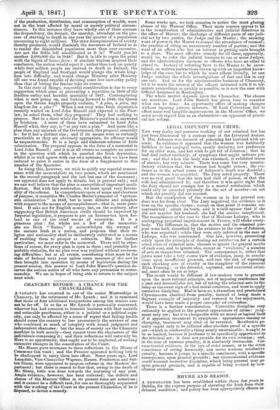LEGAL IMPUNITY FOR CRIME.
THE very faulty and perverse working of our criminal law has just been illustrated by a curious case at the Liverpool Assizes. A Mrs. Johnson was accused of poisoning her husband with ar- senic. In evidence it appeared that the woman was habitually faithless to her conjugal vows, openly declaring her preference for an older' man, and her wish to get rid of Johnson ; that he had died rather suddenly, of symptoms that might indicate poi- son ; and that when the body was exhumed, it exhibited traces of arsenic, but very minute. There was some but very unsatis- factory evidence that the woman had bought poison; the evi- dence as to the actual cause of Johnson's death was doubtful ; and the woman was acquitted. The Jury acted properly. There was no real proof that the man had died of poison, or that the- wife had administered it ; and therefore it was quite right that the Jury should not consign her to a mortal retribution which could only be awarded precisely for the act of murder—an act which she possibly did not commit.
But the exculpation of the woman as to her general con-
duct was far from clear. The Jury negatived the evidence as it bore on the specific charge ; except on that point it remains un- contradicted : admit its truth, and it would appear that if she did not murder her husband, she had the animus interficiendi. The resemblance of the case to that of Madame Lafarge, who is undergoing perpetual imprisonment in France, will -strike every- body. The difference is, that the motive and the criminal pur- pose were both described by the evidence in the case of Johnson, who was acquitted ; while they were only inferred in the ease of Lafarge, who was condemned. Our law, however, proceeding solely upon the principle of dealing set retribution for a certain select class of criminal acts, chooses to ignore the general merits of each case, and to ignore also, except as " evidence," a number of acts in themselves criminal. The consequence is, either that juries must take a very coarse view of evidence, jump to conclu- sions upon insufficient grounds, and run the risk of repeating such shocking acts of cruelty as the slaughter of the innocent Eliza Fenning ; or the detected, captured, and convicted crimi- nal, must often be set at large.
The result would be different if law-makers were to proceed
upon the more rational principle, not of imposing retribution for a past and irremediable act, but Of taking the criminal sets in the lump as the avert sign of a bad moral condition and were to apply corrective discipline. Had it been so, a shameless and proclaimed Clytemnestra absolved from penalty, instead of being made a flagrant example of impunity and restored to her enjoyments, would have been made a proper exemplar ad evitandant. There is a further consideration. Corrective discipline may rationally be applied to the general appearances of crime : judg ment may err ; but it is chargeable with no moral or logical fault if it apportion treatment to symptoms : appearances ceasing or changing, treatment may alter or be reversed. Retributive pe- nalty ought only to be inflicted after absolute proof of a specific set—which is confessedly a thing nearly unattainable : it ought to be so limited, because it professes to be specifically apportioned to the criminal act; it does not provide for its own revision; and, in the ease of extreme penalty, it is absolutely irrevocable. Cillt■ cumstantial evidence, in the eye of strict reason, or to the strict conscience of erring humanity, can never warrant retributive penalty, because it jumps to a specific conclusion, with a aped& consequence, upon general grounds ; but circumstantial evidence would warrant corrective discipline, which being general may go upon general grounds, and is capable of being revised by new ulterior evidence.


































 Previous page
Previous page